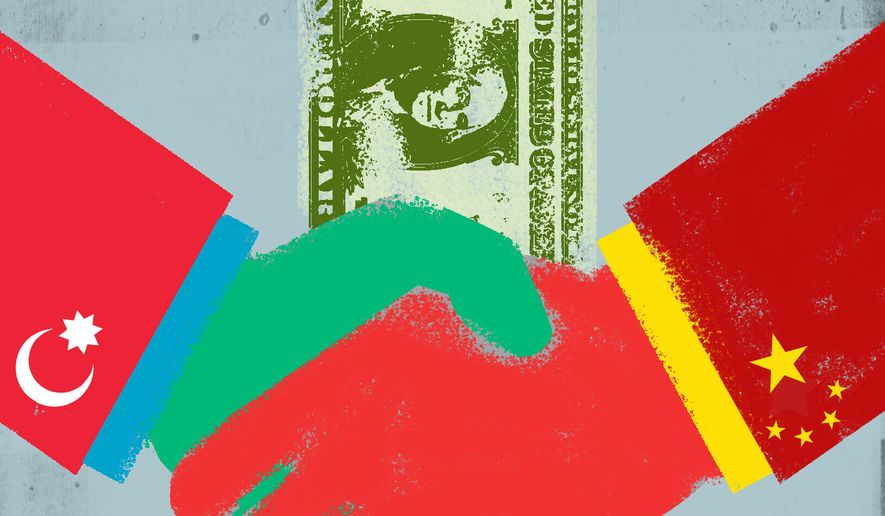A version of this story appeared in the daily Threat Status newsletter from The Washington Times. Click here to receive Threat Status delivered directly to your inbox each weekday.
OPINION:
In Washington’s crowded foreign policy agenda, the South Caucasus rarely draws sustained attention. Yet it is in such overlooked regions that influence can be lost at minimal cost.
One of the few remaining instruments of U.S. leverage is Section 907 of the Freedom Support Act, adopted in 1992 to condition aid to Azerbaijan on the ending of blockades and the use of force against Armenia and Nagorno-Karabakh. Often dismissed as a Cold War leftover, Section 907 was a bipartisan response to aggression and ethnic cleansing. Repealing it now would be strategic disarmament as Azerbaijan deepens ties with China, hedges with Russia and expands its alliance with Turkey, a NATO member whose reliability is uncertain at best.
When Congress passed Section 907, the intent was clear: U.S. assistance must reward restraint, not coercion. In the early 1990s, Azerbaijan’s blockade and expulsions were recognized across party lines as incompatible with the post-Soviet order the United States sought to shape. By embedding conditionality in law, Congress affirmed that American support had to be earned.
After 9/11, presidents were allowed to waive Section 907 on national security grounds. Every administration has done so, but the statute still required reports to Congress on how U.S. aid affected regional stability. Over time, these waivers became perfunctory, reducing conditionality to a box-checking exercise and eroding U.S. leverage. That erosion helped enable the wars of 2020 and 2023 and the ethnic cleansing of Nagorno-Karabakh’s Armenians, the outcome Section 907 was meant to prevent.
The logic of realist conditionality still applies. Azerbaijan is not a dependable ally but rather a transactional opportunist balancing between powers. Its supposed anti-Iran stance is performative; trade with Tehran continues. Its ties with Israel are an arms-for-oil deal, not a strategic alliance, and Baku has tolerated Hamas-linked actors while embracing pan-Islamic solidarity.
Nor is Azerbaijan a consistent opponent of Russia; it maintains pragmatic ties with Moscow. During the 2020 war, Russia and Turkey coordinated outcomes — Moscow deploying “peacekeepers,” Ankara supplying drones — while Western powers were sidelined. Turkey’s conduct hardly strengthens Baku’s case. It has defied U.S. interests by buying Russian S-400s, blocking NATO enlargement and promoting pan-Turkic projects that weaken Western influence.
The most consequential factor now is China. Since joining the Belt and Road Initiative in 2015, Azerbaijan has deepened cooperation with Beijing, elevating ties in 2024 to “strategic” and this year to “comprehensive strategic,” China’s highest diplomatic category. Baku now echoes Beijing’s positions on Taiwan and Xinjiang and aligns its infrastructure plans with Chinese corridors.
Geography magnifies this partnership. Straddling the Middle Corridor that links Central Asia and the Caspian to the Middle East and Europe, Azerbaijan offers China transit routes, energy flows and logistics hubs granting Beijing not just access but also strategic depth. Chinese capital now permeates Azerbaijan’s energy, petrochemical and renewable sectors. This is active enabling, not passive hedging. By lifting conditionality and partnering with Baku on such corridors, Washington would, in effect, subsidize its own competitor’s advance.
Section 907 remains a low-cost lever of influence. It requires no troops or new spending; it simply signals that U.S. aid carries conditions and that aggression has consequences. Repealing it would remove the last institutional check on Baku’s behavior and signal that Washington accepts faits accomplis without penalty. A measure once embodying deterrence would become a symbol of inconsistency.
Critics call Section 907 outdated, yet the abuses that prompted it persist. Others argue that energy imperatives demand cooperation with Baku, but conditional engagement is not exclusion; it is leverage. Europe’s reliance on Caspian gas creates mutual dependence that Washington can exploit rather than surrender. Some claim presidential waivers suffice; two decades of automatic renewals prove the opposite. Leverage erodes through predictability. To restore credibility, conditionality must again carry weight.
Once relinquished, leverage is hard to regain. Section 907 was never a lobbyist’s trophy but rather a bipartisan instrument of restraint serving enduring U.S. interests at minimal cost. It curbs coercion, supports Armenia’s westward orientation and preserves American flexibility as China and Turkey reshape the region. To repeal it now would not be modernization but strategic amnesia — a surrender of influence in the corridor linking the Black Sea, the Caspian, Turkey and the Middle East.
In foreign policy, prudence lies in preserving tools of pressure rather than dismantling them. Section 907 is one such tool. Repealing it would reward defection, underwrite Beijing’s advance and erase America’s last codified foothold in the South Caucasus. The United States should not be in the business of disarming itself.
• Den Kalmyk, Ph.D., is an expert on the post-Soviet space. He was a senior lecturer at Yale and Oxford universities from 2001 to 2008.




Please read our comment policy before commenting.